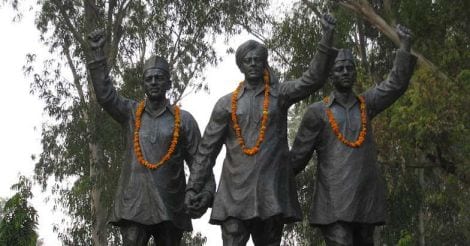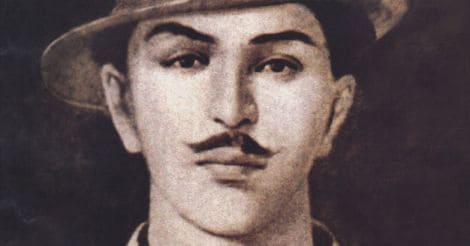The 85th death anniversary of Shaheed Bhagat Singh, the revolutionary icon of the freedom struggle, who attained martyrdom at the young age of 23, falls on Wednesday. Along with Sukhdev and Rajguru, Bhagat Singh was hanged to death less than a week before the commencement of the Karachi session of the Indian National Congress, on March 29, 1931, a landmark event of India's freedom struggle in which economic freedom was equated with political freedom.
The year 1928 was marked by an anti-Simon Commission upsurge everywhere in India. On October 30, 1928, the Simon Commission faced a large hostile crowd led by Lala Lajpat Rai at Lahore Station. Lala was severely beaten by the police under J. A. Scot, British SP and he later succumbed to his head injury.
The whole nation was stunned by this savagery. As news of the attack on Lajpat Rai spread, the country reacted with anger.
Bhagat Singh was appalled. He could not believe that a white man could dare take a stick in hand and set upon Lajpat Rai. The HSRA (Hindustan Socialist Republic Army) decided to undertake retaliatory action. On December 17, Bhagat Singh, Rajguru, Sukhdev and Chandra Shekhar Azad mistook the ASP, J.P. Scot for Saunders, as they pounced upon him and shot him dead.
A few months later, on April 8, 1929, Bhagat Singh and Batukeswar Datta threw a bomb in the Central Legislative Assembly Hall in Delhi. It was hurled from the middle of a packed gallery, not aimed at anybody, but to draw the attention of the House, the Indian people and the British rulers in India.
As Bhagat Singh and Batukeswar Dutt had planned not to escape after throwing the bomb, they were arrested. While Dutt was sentenced to transportation for life in the Assembly Bomb Case, Bhagat Singh, along with Rajguru and Sukhdev, was sentenced to death for the murder of Saunders in what became famous as the Lahore conspiracy case.
While in jail, Bhagat Singh took up the cause of bettering jail conditions and began a hunger strike. The Jail Committee requested Bhagat Singh and B.K. Dutt to give up their hunger strike, but they declined. As the fast continued indefinitely with no solution in sight, Jawaharlal Nehru visited Bhagat Singh and the other hunger strikers in jail.
Nehru gives an account of his visit in his autobiography: "I saw Bhagat Singh for the first time, and Jatindranath Das and a few others. They were all very weak and bed-ridden and it was hardly possible to talk to them much. Bhagat Singh had an attractive, intellectual face, remarkably calm and peaceful. There seemed to be no anger in it. He looked and talked with great gentleness."
Finally, it was Bhagat Singh's father who had his way. He came armed with a resolution by the Congress urging them to give up the hunger strike. The revolutionaries respected the Congress party because they knew of its struggle for India's freedom. They called Gandhi 'an impossible visionary', but they saluted him for the awakening he had brought about in the country.
 Statues of Bhagat Singh, Sukhdev and Rajguru. Photo: Wikipedia
Statues of Bhagat Singh, Sukhdev and Rajguru. Photo: WikipediaAs days of execution of Bhagat Singh and his comrades drew near, appeals from all over India, from all sections of people poured in, usually addressed to the Viceroy asking him to stay the execution. Gandhi met Irwin on March 19th and pleaded for the reprieve of Bhagat Singh and his two colleagues from the death sentences to which they had been condemned. He reinforced this oral request with a powerful appeal to the charity of a "great Christian" in Young India.
Bhagat Singh, Rajguru & Sukhdev were hanged to death on March 23, 1931. As the news of Bhagat Singh's execution spread the nation went into mourning. There were processions throughout the country. Many went without food. People wore black badges and shut down their businesses to express their grief.
A pall of gloom hung over the Motilal Nehru pandal at the annual Congress session in Karachi. When the session was scheduled for March 29, 1931, nobody had an inkling that Bhagat Singh, Sukhdev and Rajguru would be hanged. A procession to be led by president-elect Sardar Vallabhbhai Patel was abandoned in grief.
Jawaharlal Nehru sponsored a resolution which was seconded by Madan Mohan Malviya. According to Kuldip Nayar in 'The Life and Trial of Bhagat Singh': "Gandhi chose Nehru to pilot the resolution because he was popular among the youth. Patel was heckled." A part of the resolution read: "This Congress while dissociating itself from and disapproving of political violence in any shape or form, places on record its admiration of the bravery and sacrifice of the late Sardar Bhagat Singh and his comrades, Sukhdev and Rajguru, and mourns with the bereaved families the loss of these lives. This Congress is of the opinion that this triple execution is an act of wanton vengeance and is a deliberate flouting of the unanimous demand of the nation for commutation."
What soothed the emotions was a speech by Bhagat Singh's father, Kishen Singh. Delegates wept loudly and openly as Kishen Singh recalled Bhagat Singh's words: "Bhagat Singh told me not to worry. Let me be hanged. But he made a fervent appeal: 'You must support your general (Gandhi). You must support all Congress leaders. Only then will you be able to win independence for the country.'"
Subhash Chandra Bose had told Gandhiji that they should, if necessary, break with the Viceroy on the question of Bhagat Singh and his two comrades: "Because the execution was against the spirit, if not the letter, of the Delhi pact." Still, Netaji added: "It must be admitted that he (Gandhi) did try his very best."
Gandhi's secretary, Mahadev Desai also quoted the Mahatma as saying: "I was not here to defend myself and hence I have not placed the facts as to what I have done to save Bhagat Singh and his comrades. I have tried to persuade the Viceroy with all the methods of persuasion I had. After my last meeting with the relatives of Bhagat Singh, on the appointed date, that is, 23rd morning, I wrote a personal letter to the Viceroy, in which I had poured in my whole being - heart and soul - but it has all gone in vain... Pandit Malaviyaji and Dr Sapru also did their utmost."
Lord Irwin took the public into confidence on his reasons for rejecting Gandhi's appeal. In his farewell speech on 26th March, 1931, Irwin said: "As I listened the other day to Mr. Gandhi putting the case for commutation formally before me, I reflected first on what significance it surely was that the apostle of non-violence should so earnestly be pleading the cause of devotees of a creed fundamentally opposed to his own, but I should regard it as wholly wrong to allow my judgment on these matters to be influenced or deflected by purely political considerations. I could imagine no case in which under the law the penalty had been more directly deserved."
The jail diary of Bhagat Singh makes for an interesting historical reading. He wrote shortly before his death : "They (the youth) should aim at a Swaraj for the masses based on socialism. That was a revolutionary change which they could not bring about without revolutionary methods..." Bhagat Singh exhorted Punjab's youth to follow Nehru. He called Nehru and Bose as a "redeeming feature of the freedom struggle" during the 1920s.
In his last letter to his youngest brother, Kultar, he quoted the popular Urdu couplet: Khush raho ahle watan hum to safar karte hain (Goodbye, dear countrymen, we proceed on our journey).
(With inputs from Agencies)

























